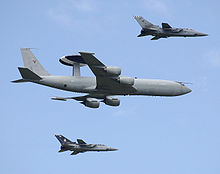
Radar configurations and types is an article about listing the different uses of radars.
Radar come in a variety of configuration in the emitter, the receiver, the antenna, wavelength, scan strategies, etc.
Search radars scan a wide area with pulses of short radio waves. They usually scan the area two to four times a minute. The waves are usually less than a meter long. Ships and planes are metal, and reflect radio waves. The radar measures the distance to the reflector by measuring the time of the roundtrip from emission of a pulse to reception, dividing this by two, and then multiplying by the speed of light. To be accepted, the received pulse has to lie within a period of time called the range gate. The radar determines the direction because the short radio waves behave like a search light when emitted from the reflector of the radar set's antenna.
Targeting radars use the same principle but scan a much narrower area far more often, usually several times a second or more, where a search radar might scan more widely and less frequently. Missile lock-on describes the scenario where a targeting radar has acquired a target, and the fire control can calculate a path for the missile to the target; in semi-active radar homing systems, this implies that the missile can "see" the target that the targeting radar is "illuminating". Some targeting radars have a range gate that can track a target, to eliminate clutter and electronic countermeasures.